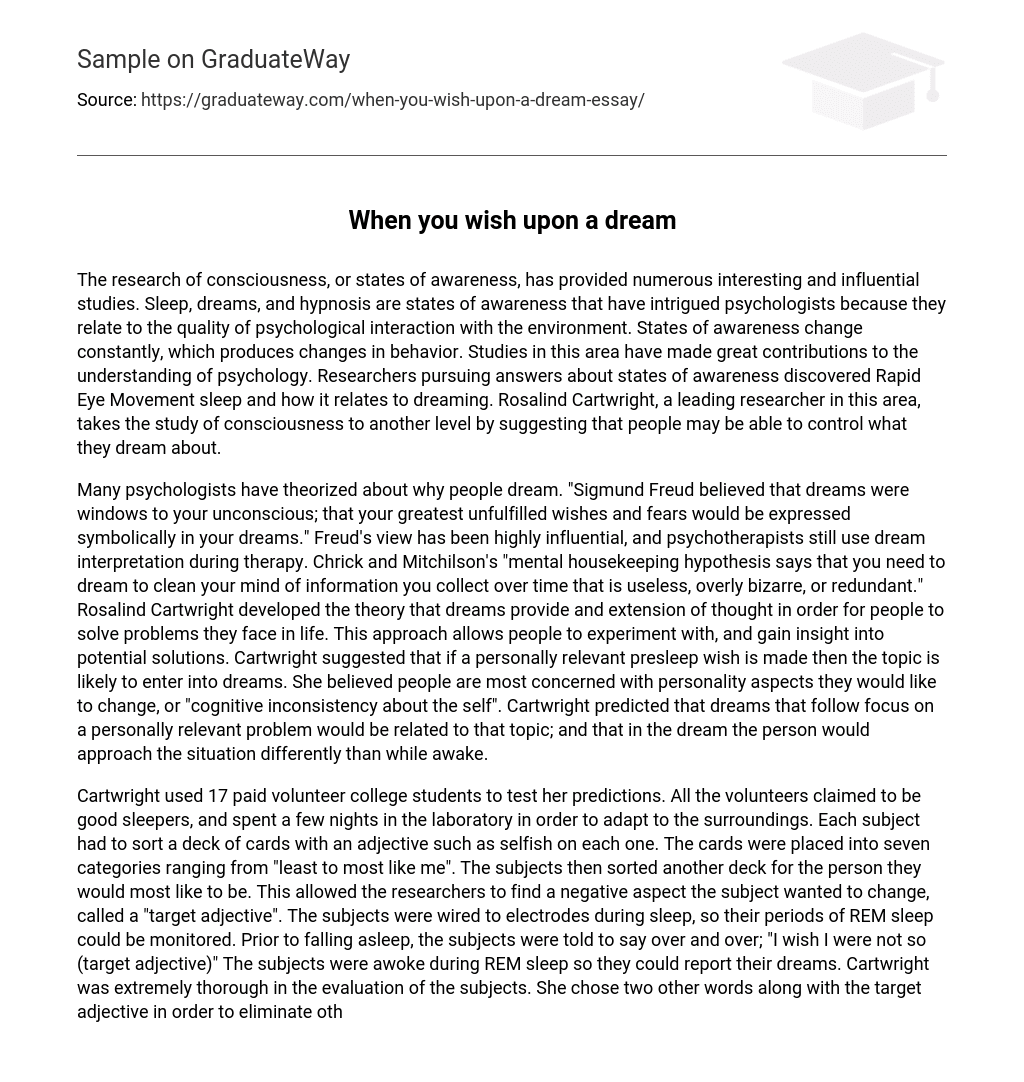The investigation of consciousness, or states of awareness, has yielded numerous captivating and influential studies. Sleep, dreams, and hypnosis are all states of awareness that have fascinated psychologists due to their connection to the quality of psychological interaction with the environment. These states of awareness are constantly changing, resulting in corresponding changes in behavior. The field of study in this area has greatly contributed to our comprehension of psychology. Researchers exploring states of awareness have made notable advancements, including the discovery of Rapid Eye Movement sleep and its correlation with dreaming. Leading researcher Rosalind Cartwright has taken the study of consciousness to new heights by proposing that individuals may have the ability to exert control over their dreams.
Numerous psychologists have offered theories on the purpose and meaning of dreams. According to Sigmund Freud, dreams serve as a portal to the unconscious mind, enabling the expression of unfulfilled desires and fears through symbolic imagery. This viewpoint has had a significant influence, with dream interpretation remaining a fundamental tool in psychotherapy. Another perspective, known as the “mental housekeeping hypothesis” proposed by Chrick and Mitchilson, suggests that dreaming acts as a cognitive process to rid the mind of useless, bizarre, or redundant information accumulated over time. Rosalind Cartwright further developed the theory that dreams facilitate problem-solving by providing an extension of thoughts. By exploring potential solutions and gaining insights, individuals can tackle the challenges they face in waking life. Cartwright contended that dreams are influenced by personally relevant wishes made prior to sleep, particularly those related to desired changes in one’s personality or cognitive inconsistencies about oneself. In such cases, she predicted that dreams would center around the identified problem and involve different approaches compared to wakefulness.
Cartwright conducted an experiment using 17 volunteer college students who identified themselves as good sleepers. These individuals spent a few nights in the lab to get accustomed to the environment. Each participant was given a deck of cards with adjectives, such as “selfish,” and asked to sort them into seven categories from least to most similar to themselves. They also sorted another deck of cards for the person they aspired to be, which helped identify a negative aspect they wished to change, referred to as a “target adjective.” During sleep, the subjects were fitted with electrodes to monitor their REM sleep cycles. Before falling asleep, they were instructed to repeatedly say, “I wish I were not so (target adjective).” The subjects were woken up during REM sleep to record their dreams. Cartwright meticulously evaluated the subjects and selected two additional words along with the target adjective to eliminate other potential dream motivations. She explained, “If only the target word is consistently incorporated in a significant number of cases, it could be argued that this is one possible way dreams are formed: bringing attention to a tension area prior to sleep.” To validate this theory, the control words were included in the analysis of each subject.
Cartwright’s findings confirmed her predictions regarding the reasons for dreaming. The majority of participants (15 out of 17) had dreams that were related to the adjective representing their target, while only two individuals experienced dreams that contradicted their self-descriptive adjective. This provides evidence that our approach to situations in dreams differs from our waking state. Some subjects dreamt where their ideal characteristic was embodied by another character, but this trait caused difficulties for that character. Cartwright argues that these results demonstrate how dreaming serves the purpose of exploring emotional areas of tension. Other researchers have built upon Cartwright’s work, with a recent study focusing on the capacity to control dreams as they occur. Previous research conducted in the 1980s demonstrated the possibility of being aware and conscious during REM sleep, commonly referred to as lucid dreaming. Lucid dreamers often possess the ability to manipulate or alter the content within their dreams.
Gaining a deeper understanding of consciousness can provide mankind with various benefits. One advantage is the potential to utilize dreams for valuable psychotherapy purposes, such as experimenting with personal changes by learning to control them. Similarly valuable is the practice of accurately interpreting dreams, which alone can serve as a form of psychotherapy. Another benefit is the ability to use lucid dreaming to overcome nightmares. Dreaming in general offers profound insights into one’s mind and soul. By evaluating and comprehending their dreams, individuals can acquire numerous strategies for facing life’s challenges, ultimately enhancing self-understanding and equipping people with improved problem-solving approaches.





